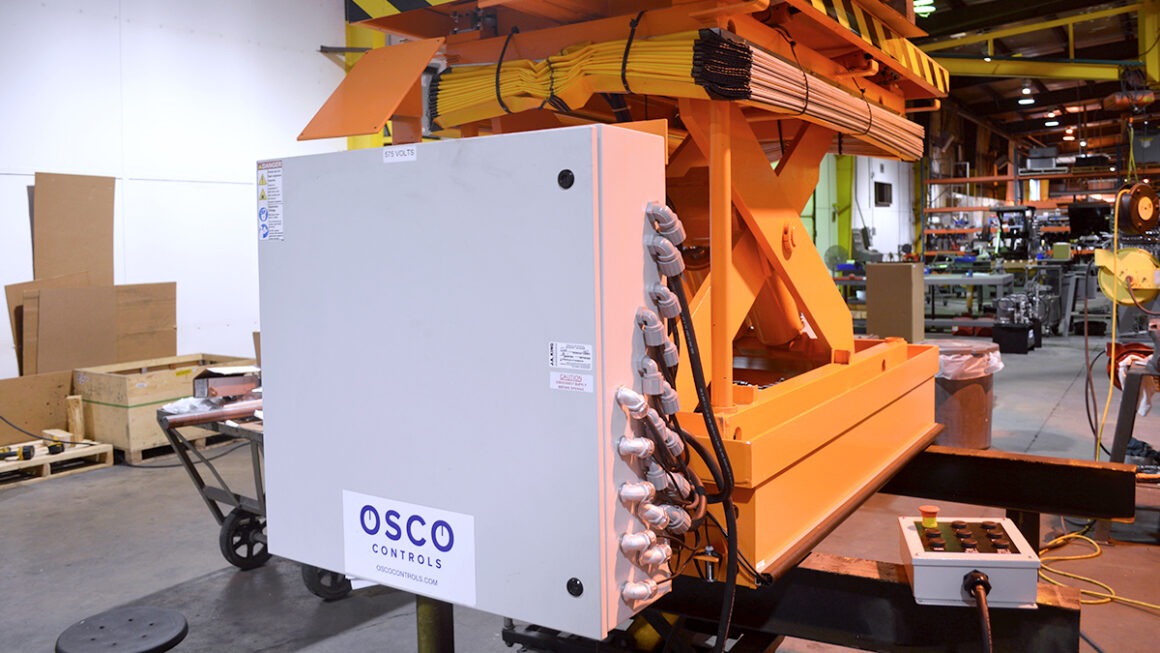Industrial automation has revolutionized manufacturing, material handling, logistics, and many other industries by enhancing efficiency, improving safety, and reducing costs. However, the road to full automation is not without its challenges. From complex system integrations to workforce modifications, businesses often encounter substantial barriers to automation. At OSCO Controls, we specialize in providing automation solutions that help companies navigate these obstacles and achieve their goals. In this blog, we’ll explore common challenges in industrial automation and share strategies to overcome them.
Ready to overcome automation challenges? Contact OSCO Controls today for expert guidance and solutions tailored to your needs!
Unlocking the Potential of Industrial Automation: Opportunities and Challenges
The rise of industrial automation has unlocked unique opportunities for businesses to improve productivity, streamline operations, and reduce human error. Automation allows companies to respond more quickly to market demands, enhance product quality, and optimize resource utilization. However, implementing automation is not always straightforward. Barriers such as high upfront costs, technical complexity, and workforce resistance can hinder progress. Understanding these challenges and addressing them strategically is critical to successful automation.
Why Overcoming Barriers to Automation is Critical
Companies that fail to address automation challenges risk falling behind competitors who embrace advanced technologies. By overcoming obstacles and leveraging strategic industry automation practices, businesses can remain competitive, adapt to evolving market trends and demands, and future-proof their operations.
Key Challenges in Industrial Automation
While the benefits of industrial automation are clear, businesses often face several common barriers during implementation. Let’s break down these challenges:
- High Initial Costs: Automation often requires significant investment in equipment, software, and infrastructure. The upfront costs can deter businesses, especially small to medium enterprises, from adopting advanced systems.
- System Integration Complexities: Many facilities operate with legacy systems that can be difficult to integrate with modern automation technologies, creating compatibility issues.
- Workforce Resistance: Employees may fear job loss or struggle to adapt to new systems, leading to resistance and slow adoption.
- Data Management Issues: Automation generates vast amounts of data, requiring advanced systems to manage, access, analyze, and secure it effectively.
- Scalability Concerns: Businesses often worry about whether their automation solutions will grow with them, making scalability a key concern.
- Lack of Expertise: Implementing automation requires specialized knowledge, which can be a barrier for companies with limited technical expertise.
Strategies to Overcome Barriers to Automation
At OSCO Controls, we understand the challenges businesses face and provide automation solutions and implementation strategies that help overcome these barriers. Here are our recommendations for tackling the most common issues:
- Addressing High Costs:
Start by identifying processes that provide the highest ROI when automated. Focus on phased implementation rather than automating everything at once. Our team can create modular automation solutions that allow businesses to start small and scale over time, reducing upfront costs while achieving measurable results. - Simplifying System Integration:
Invest in control systems designed for seamless integration. OSCO’s expertise in custom control panels ensures compatibility with both legacy equipment and modern automation technologies. Our team will work closely with you to develop solutions tailored to your unique operational needs. - Overcoming Workforce Resistance:
Engage employees early in the automation process by emphasizing the benefits of industrial automation, such as improving safety and reducing repetitive tasks. Provide comprehensive training to help workers adapt to new systems. At OSCO, we prioritize user-friendly control interfaces that simplify adoption and enhance confidence. - Improving Data Access and Management:
Implement advanced data management systems capable of handling large volumes of information in real-time. OSCO Connect offers intuitive cloud-based monitoring, management, and reporting using a seamless interface. From dashboards to diagnostics, OSCO Connect delivers actionable insights for decision-makers. - Ensuring Scalability:
Choose scalable automation solutions that can grow with your business. OSCO’s customizable systems are built with flexibility in mind, allowing companies to add new capabilities without overhauling their entire infrastructure. - Closing the Expertise Gap:
Partner with experienced providers like OSCO Controls. Our team of experts offers guidance throughout the automation journey, from initial design to system deployment and ongoing support.
Benefits of Strategic Industry Automation
By addressing barriers and implementing strategic industry automation, businesses can unlock a wide range of transformative benefits that directly impact their bottom line and overall efficiency.
- Increased Productivity: Automation allows companies to operate continuously without interruptions, maximizing output while reducing downtime. Tasks that previously required hours of manual labor can now be completed in minutes, enabling businesses to meet tight deadlines while adapting to market demands more effectively.
- Improved Safety: Automated systems can take over hazardous tasks such as handling heavy machinery, working with dangerous chemicals, or operating in extreme environments. By minimizing human involvement in risky processes, companies can reduce workplace accidents, protect employees, and comply with safety regulations more easily.
- Enhanced Quality Control: Automated systems are designed to deliver consistent performance, eliminating unintended variations created by human error. Advanced control panels and monitoring systems ensure that every product meets exact specifications, enhancing customer satisfaction, elevating quality, and reducing waste.
- Data-Driven Decision-Making: Automation systems generate vast amounts of real-time data, providing meaningful insights into operational performance. With better visibility into metrics such as energy consumption, machine efficiency, and production rates, businesses can make informed decisions that drive growth and streamline workflows.
- Sustainability: Automation can play a significant role in achieving sustainability goals by optimizing energy use, reducing material waste, and incorporating recycling processes. Businesses can lower their environmental footprint while maintaining solid performance levels.
Common Automation Applications Across Industries
Automation is revolutionizing processes across a wide array of industries, from manufacturing and logistics to oil & gas. With its versatility and scalability, industrial automation has the potential to transform operations and deliver measurable improvements in productivity, safety, and quality.
- Manufacturing: Automating assembly lines, quality control, and equipment monitoring enables manufacturers to increase production efficiency while maintaining consistent product quality. Robotic arms, automated conveyors, and intelligent sensors are frequently used to streamline production processes.
- Warehousing and Distribution: Automated systems improve inventory tracking, order fulfillment, and warehouse management. Autonomous vehicles and robotic pickers can handle inventory with speed and precision, reducing manual labor requirements and improving accuracy.
- Recycling: Automation in recycling facilities enhances sorting, processing, and material recovery efficiency. Using advanced control systems, recycling plants can sort and process recyclable materials more effectively, reducing contamination and increasing the value of recovered materials.
- Oil & Gas: In the oil & gas industry, automation plays a crucial role in enhancing safety and operational effectiveness. Remote monitoring systems, automated drilling rigs, and predictive maintenance solutions minimize downtime and improve safety in high-risk environments.
- Water/Wastewater: Automation in water and wastewater management ensures efficient treatment processes, optimal resource utilization, and compliance with environmental regulations. Advanced control systems monitor and regulate water flow, chemical dosing, and filtration processes, improving overall system reliability. OSCO’s expertise in designing tailored automation solutions helps water/wastewater providers enhance performance and reduce environmental impact.
- Utilities: Automation in the utility sector plays a vital role in optimizing energy distribution, monitoring critical infrastructure, and improving system reliability. From smart grid management to predictive maintenance, automated solutions ensure efficient operation and minimal downtime. OSCO’s control systems are built to handle the complexities of the utilities industry, delivering robust, scalable solutions for long-term success.
Partner with OSCO Controls for Advanced Automation Solutions
At OSCO Controls, we’re committed to helping businesses overcome challenges and unlock the full potential of industrial automation. Our tailored automation solutions are designed to address your specific needs, regardless of your industry, ensuring seamless integration, scalability, and long-term success.
- Customized Control Panels: Designed for your unique operational requirements.
- Expert Guidance: Our team supports you at every stage, from planning to deployment.
- Scalable Systems: Built to grow with your business and adapt to future needs.
Ready to transform your operations with advanced automation? Contact OSCO Controls today for a free quote!
Overcoming Automation Challenges to Drive Success
Embracing industrial automation is no longer optional for businesses that want to remain competitive in today’s fast-paced markets. While barriers to automation exist, they can be overcome with the right strategies and the help of a trusted partner like OSCO.
By addressing challenges such as high costs, system integration, and workforce resistance, companies can unlock the full benefits of automation, from improved productivity to enhanced safety. We bring over 35 years of expertise to every project, delivering custom automation solutions that help businesses overcome barriers and fully harness the transformative power of industrial automation.
Don’t let automation challenges hold your business back! Contact us today, and let’s explore how our automated control systems can help you achieve your goals and transform your operations.

